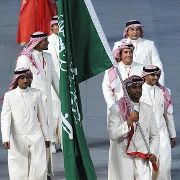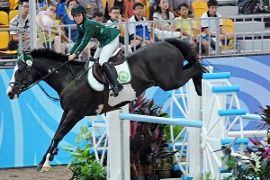|
The International Olympic Committee is often a frustrating group to watch, and it's not always the IOC's fault. The Olympic Games are no less politically nuanced or less difficult to govern than the rest of the planet. But when it comes to Saudi Arabia's existence as the only participating nation that is not planning to bring a female athlete to the London Olympics, which begin July 27, the IOC doesn't deserve a pass on this issue any more than the Saudis do. After years of talking back and forth, it's time for the IOC to live up to its own charter and give the Saudis the same unequivocal choice that South Africa's regime was given during its 28-year ban because of apartheid, or Afghanistan was given in 2000 because of the Taliban's policies toward women: If you're not prepared to make your teams open to everyone, then you're not invited to the Olympics until you are.  Finally holding the Saudis to the same standard would be a dramatic step for the IOC to take. It's also long overdue. Unfortunately, it appears the IOC still isn't willing to put that condition on the table, judging from the IOC's response Tuesday to an ESPN.com request for comment. IOC head of media relations Emmanuelle Moreau replied via email that talks between the IOC and the Saudi Arabian Olympic Committee remain "ongoing" and the IOC remains hopeful, which echoed a statement that IOC president Jacques Rogge made to reporters last week. Moreau added: "The IOC does not give ultimatums nor deadlines but rather believes that a lot can be achieved through dialogue." It's a nice thought. Can't we all just talk this out? And talking did work with Brunei and Qatar, two other Muslim nations that finally relented and will send women athletes to the Olympics for the first time, leaving the Saudis alone in foot-dragging. Still, cynics can't help noting the most conspicuous difference between Afghanistan being banned from Olympic competition on the same gender-discrimination grounds 12 years ago while Brunei, Qatar and the Saudis were not is this: Afghanistan doesn't export oil to the West. Qatar is also bidding for the 2020 Summer Games. The Saudis are now the last holdouts. And they've been floating conflicting messages for months about not just if the ultra-conservative Muslim kingdom would include women on its Olympic team, but under what circumstances. In March, a Saudi prince said women could compete in the Games as long as they didn't defy Islamic laws, but in April, the head of the kingdom's Olympic committee said that female inclusion in the Games had not been approved. In late June, the Saudi embassy in London issued a statement saying that the country wouldn't block female athletes from competing -- but the Saudis have also set two caveats: It would happen only if their women meet the Olympic qualifying standards, and even then, only if they agree to compete as part of the IOC delegation without the official endorsement of the Saudi Olympic team. (There was even the name given of a 20-year-old Saudi-born equestrian who was raised and lives in Europe. But Dalma Rushdi Malhas has since been ruled out amid conflicting published accounts of whether she'd even been officially approached. There have also been unconfirmed reports that there might be a short list of other women under consideration.) What the IOC should be telling the Saudis is neither of their conditions for bringing women athletes to London is acceptable. Declaring that female Saudi athletes would not be officially endorsed by the Saudi team still treats women as second-class citizens. That's a stance that is expressly addressed at the beginning of the Olympic charter, and again in the IOC's definition of Olympism, which read, in part: "The practice of sport is a human right. Every individual must have the possibility of practicing sport, without discrimination of any kind and in the Olympic spirit" and "Any form of discrimination with regard to a country or a person on grounds of race, religion, politics, gender or otherwise is incompatible with belonging to the Olympic Movement." The Saudis' second condition -- that Saudi women in any sport meet the qualifying standards -- is a false roadblock. The Saudis know full well that the IOC routinely grants wild cards to athletes from developing nations with nascent sports programs. And the IOC certainly would grant the same wild-card entry in this landmark case, given the pressure it and other human rights organizations are already exerting on the Saudis to diversify their team.  Sports is hardly the only area where Saudi women face challenges in daily life. Last September, Saudi women were granted the right to run for office and vote, but they are still banned from driving or appearing in public without covering everything except their hands and eyes. They remain dependent on male permission to work, study or even leave the home. Physical education is not offered for girls in school, and even female-only private gyms were closed across the country a few years ago despite alarming rates of obesity among women. Some critics of the Saudi Olympic policy, including Human Rights Watch's Christoph Wilcke, have asserted that "Saudi clerics agree there is no religious prohibition on women exercising ... just the public aspect of sports." But the actual truth is not so cut and dried, insists Irshad Manji, a Canadian-born Muslim of Egyptian and Indian descent, and an expert on Islamic religion and culture. Manji is a professor of leadership at New York University and best-selling author of two books about Muslim issues (one of which, "The Trouble With Islam Today," was downloaded a quarter of a million times in Saudi Arabia after she made it available online for free in certain Arab nations). She is also a frequent and fierce critic of the way the Islamic faith has been interpreted as a tool against women across the world, and has endured numerous death threats and interruptions of overseas appearances by fundamentalist Muslim groups as a result. And still, Manji says, "Most Muslims genuinely do have some confusion about whether [women's treatment] is only cultural or also religiously prescribed in the Koran -- I don't agree with people who dismiss the religious grounds. The most honest position to take is, like other scriptures like the Bible and the Torah, the Koran contains contradictory passages about women that can be interpreted in many different ways, including female-friendly ways." But Manji agrees the IOC needn't even argue its case with the Saudis on those grounds. This standoff is not about the West trying to tell the Saudis how to run their country or practice religion. It's about how the IOC wants to run its Olympic Games. It's about the values the IOC purports to support as a condition of participation. "It's a secular human rights issue," Manji agrees. Saudi women are challenging the status quo and trying to take more control of life within their own country. As Saudi Princess Adela bint Abdullah said not long ago at a forum examining the glacial improvement for women in all walks of life, including sports, "A society cannot walk with a limp." Manji's hope is that moderate Muslims -- not just the IOC -- raise their voices about not just the Saudi Olympic team, but life in general for women inside the kingdom. And indeed some have, in places like the letter to the editor pages of the Arab News. Last week, a reader named Masood Khan pointedly asked, "We expect Saudi male athletes to maintain modesty while interacting with hundreds of non-veiled female sportswomen from other countries, then why suspect our mothers, daughters, wives and sisters of 'moral corruption?'" The London Games are less than three weeks away. Women now play sports in all Muslim and Arab countries with support from their governments and national sporting authorities –- except in Saudi Arabia. The Saudis have had 12 years since Afghanistan was banned for gender discrimination to get their house in order. "What I would like to see the IOC also push for," says Manji, "is not just throwing one woman on the team for public consumption outside Saudi Arabia, but sincere changes like opening up more opportunities within the country for girls and women after that." The IOC's Moreau wrote Tuesday that any athlete can be added to the Olympics until a few days before the Games start. Rogge's statement last week that he remains "cautiously optimistic" the Saudis will not arrive with another all-male team was all fine and good. But it's time for Rogge to find the spine to set an all-or-nothing caveat of his own: The Saudis are welcome to come to London with a coed team. But if they refuse? Rogge should tell them, "Stay home."
|
